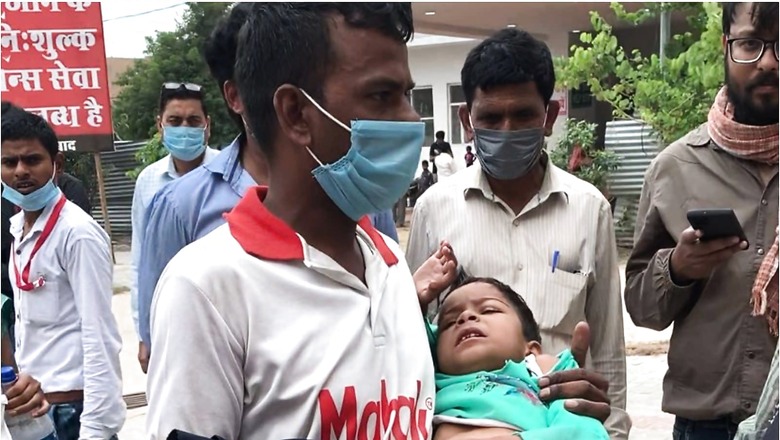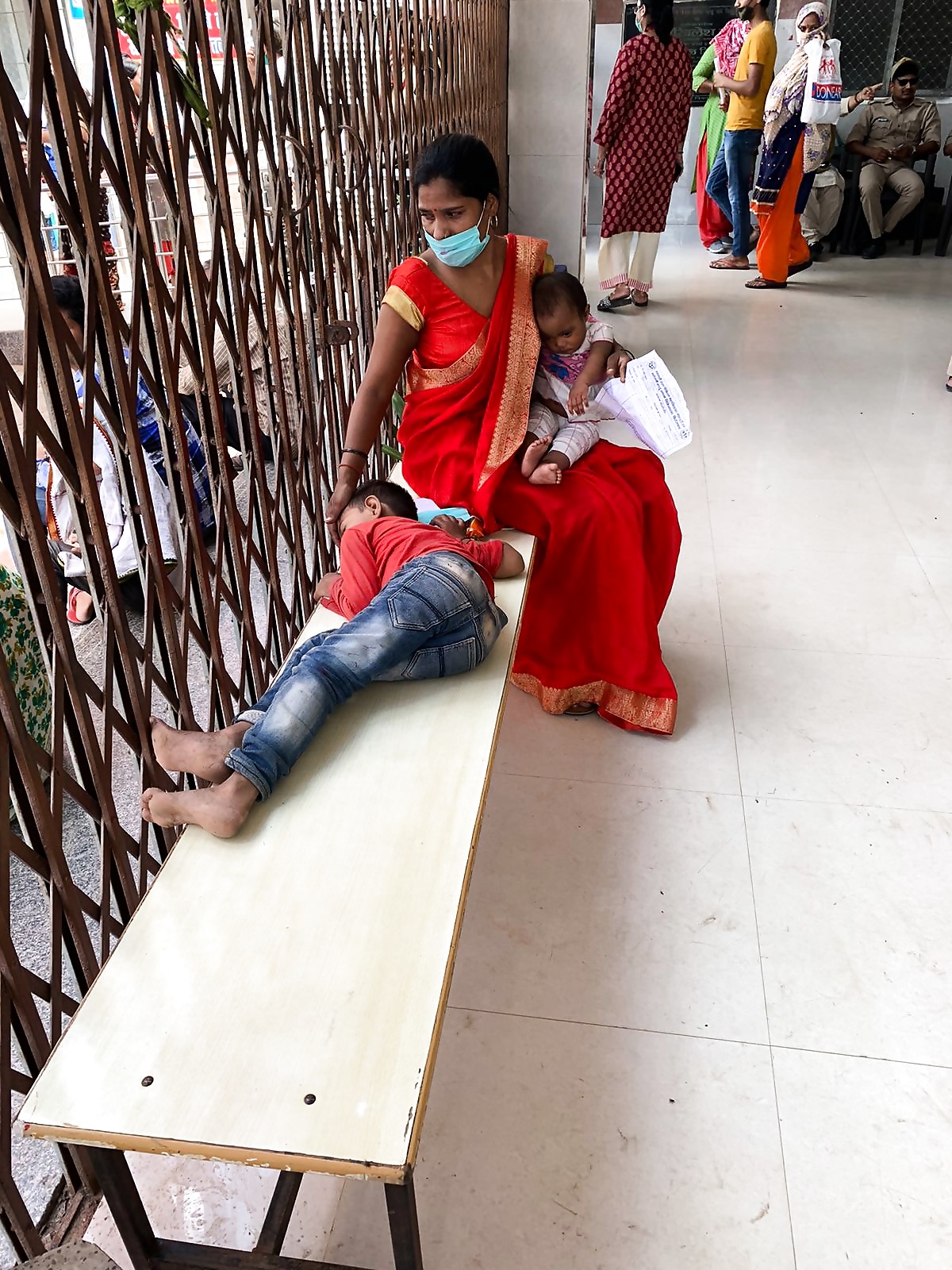
views
A month on, Firozabad district in Uttar Pradesh is reeling from a deadly dengue fever and seasonal illnesses that have put the already-stressed healthcare system there under intense scrutiny and triggered panic among parents of children and adolescents who are getting sick in large numbers, even though authorities say the situation is improving.
Viral fevers, including that caused by dengue, have killed 45 children and adolescents aged between six months and 17 years in about a month, a tragedy that has prompted the Centre to rush an expert team to the district in Agra division. The team has found the D2 strain of dengue responsible for haemorrhage among patients in the area.
In Pics: Dengue, Seasonal Illnesses Grip Firozabad’s Young As Panic Sets In Among Parents
Officials say lack of timely action by parents in the early days of the outbreak, wrong treatment by quacks, and seasonal flu and malaria, among other diseases, have compounded the problem that first grabbed media attention around the third week of August.
Health staff at Firozabad Medical College’s Sau Shaiya ward, or the paediatric centre, are working round the clock, even as tragic scenes are unfolding there. Until recently, children and their parents waited for hours in the lobby for admission. That has stopped, but the stress on the healthcare system is visible with a section of parents complaining of relapse and seeking readmission for their children.
‘Situation improving’
Dr Sangeeta Aneja, Firozabad Medical College’s principal and dean, said 459 of the 550 beds available at the children’s ward were occupied as of Wednesday. And not all of them were allotted to dengue patients.
“Just one-third of these beds have been occupied by dengue patients. Rest all are taken by children suffering from dysentery, diarrhoea, malaria, pneumonia etc.,” Aneja said, but added that the overall situation was “improving”.
“Earlier, we had 350 beds in the paediatric building — due to which we were facing a shortage,” she said. “Now, we are also using two blocks from the new building, which is still under construction.”
Aneja admitted that panic had set in among parents, who didn’t want to take a chance and were bringing children suffering from common cough and cold to the hospital for admission and blood tests. “This is further adding to our problem, but we cannot deny testing them,” she said.
But, during the initial days of the outbreak, several children were brought to the hospital only when it was too late, two doctors said, requesting anonymity.
Aneja blamed local doctors and quacks for aggravating the crisis. “If it’s dengue, prescribing medicines such as Ibugesic will only do harm. But quacks and local doctors are making things worse for us,” she said.
This News18.com correspondent present at Firozabad’s largest public hospital on Wednesday saw 15 children — aged between 4 years and 17 years — being taken to the paediatric centre in the morning. By 1pm, according to admission records, the count had risen to 69. While News18.com did not see anyone waiting outside the hospital for beds, parents of supposedly recovered patients came back for readmission.
The patients arrived on auto-rickshaws, motorcycles or emergency vans deployed by the hospital. Their primary complaints were high fever, extreme weakness and, in some cases, swollen belly.
‘No beds available’
The scene at Firozabad city’s biggest private hospital, Ravi Unity, were different. The 100-bed hospital had no vacancy. An official said makeshift arrangements won’t help at this stage.
“I can use sofa sets (as beds) to admit more patients, but from where will I manage to get more doctors?” he asked.
Outside the hospital premises, a family could be seen crying for help as their 10-year-old child was running a high fever. He had undergone treatment at Ravi Unity and was recently discharged.
“His belly is swollen. Hospital officials say they are unable to admit more people and have advised us to take our child to Agra,” his aunt said, while the mother kept crying.
‘Delay in test reports’

Back at the medical college, a messy queue of over 30 people had formed near the report collection centre. Geeta Devi, a resident of Paharpur village, was anxiously waiting for the blood test reports of her six-month-old daughter and six-year-old son. She was holding the infant in her arms, while her son was sleeping on a bench.
“My children have not eaten much for the last one week. Both have high fever, and they keep vomiting after eating. Their blood samples were taken yesterday (Tuesday), but the reports haven’t come yet,” she said; tears rolling down her cheeks.
“They first told me it would come by 10:00am (Wednesday) but now they are saying it will arrive by lunch time.”
Also in the queue was Sadhna Kumari. The resident of Firozabad’s Mathura Nagar was waiting for her 17-year-old son’s report. She said it had been pending for two days.
While both of them said their children had high fever, they didn’t know the exact reading. “We don’t have that machine (thermometer),” they said, looking at each other. “The children are very warm. We can feel it with the touch of our palm.”
Dean Aneja said the hospital was conducting over 750 blood tests every day — out of which one-third were coming positive for dengue. She denied that the reports were being delayed.
“We are using two methods. One is instant report by using card tests and the other is by using ELISA test kits. ELISA takes some time but it is not delaying the report,” she said.
Cases of readmission
Several parents said their children started feeling unwell again after discharge and had to be readmitted.
News18.com saw a father and his five-year-old son reaching the hospital with a relative on a motorbike.
“My son was discharged, but he wasn’t feeling well. Yesterday (Tuesday) I got his platelets checked at a private laboratory. The levels were very low, at 25,000 (the normal level is 150,000 to 450,000 platelets per microliter of blood),” he told a doctor. He was asked to admit the child again.
He was not alone. “My child was released two days ago, but he is still feeling uneasy. The doctor has asked us to get some tests done. We are waiting for the results,” said Kabita Kumari. Her seven-year-old son was sleeping in her lap.
Aneja confirmed that the hospital was readmitting those requiring further treatment. “Reports from private labs can be different. We run our own tests again when patients come back with complaints and readmit children who require further treatment,” she said.
Increased vigil
The situation is “much better” now, Firozabad chief medical officer Dr Dinesh Premi, who took charge on September 1, said.
While the opposition Samajwadi Party has blamed “poor health services” for the unfolding tragedy, the Bharatiya Janata Party (BJP)-led state government has sent Premi’s predecessor Neeta Khulshreshtha to Aligarh as senior consultant in the wake of the crisis.
Premi has ordered house-to-house surveys and setting up of health camps to understand the extent of the outbreak. According to the data collected by his team, cases of fever in the city have reduced to almost half.
“We were reporting more than 3,000 cases of fever every day. Now, it’s 1,600 per day.
“Also, the cases of dengue are not very high. Till now, we have found 1,800 cases of dengue, as diagnosed by hospitals in Firozabad. Dengue is one of the many fevers that have been doing the rounds, including viral flu, malaria, pneumonia and scrub typhus,” he said.
A death audit is also underway. “In the last 10-12 days, Firozabad has reported 30,000 cases of fever. Till now, 61 deaths (including that of 45 children) have been recorded, but the ongoing death audit will give us an exact number and the reasons,” Premi said.
Read all the Latest News , Breaking News and Ukraine-Russia War Live Updates here.
















Comments
0 comment